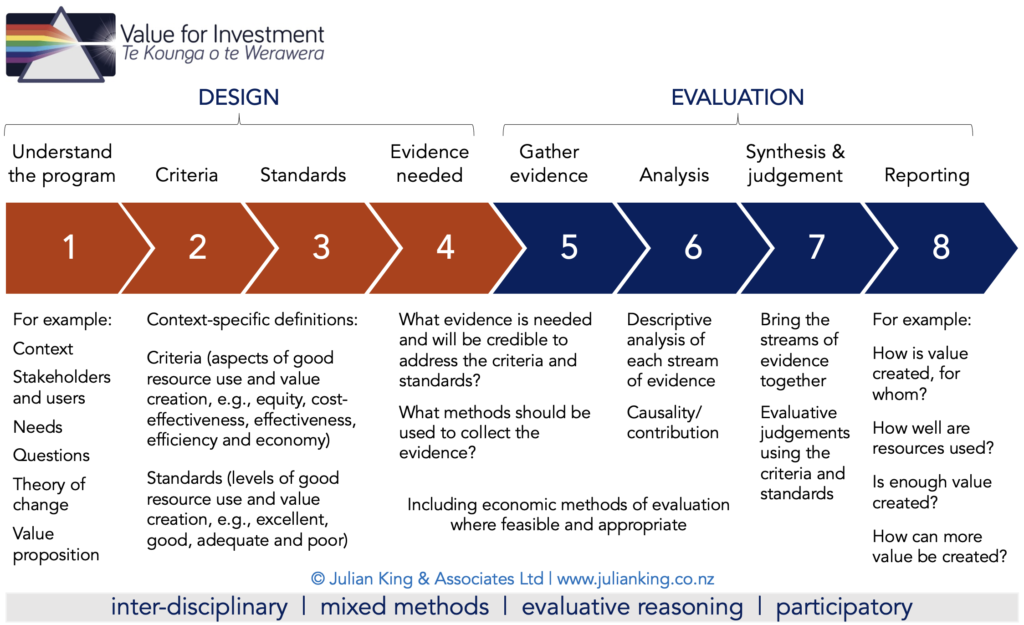Value for Investment Resources
This page provides links to free Value for Investment resources.
Scroll down for practical guidance, theory, examples, blogs, social media links, and other resources.
What is Value for Investment?
Value for Investment (VfI) is a system to help you align evaluative thinking, methods and tools to answer ‘value for money’ questions. The VfI approach is built on four key principles:
- Inter-disciplinary (combining economic and evaluative thinking)
- Mixed methods (combining quantitative and qualitative evidence)
- Evaluative reasoning (interpreting evidence through the lens of explicit criteria and standards)
- Participatory (engaging stakeholders in co-designing the evaluation and making sense of the evidence).
The system includes a stepped approach, making it intuitive to learn and practical to use. Click here for a worked example.

Diagram also available in Portuguese here.
The following resources are open access. Please use and share.
Practical guidance

King, J., Hurrell, A. (2024). A Guide to Evaluation of Value for Money in UK Public Services: Why cost-benefit analysis alone may be insufficient to evaluate VfM, and how to navigate a solution. Verian Group.
King, J., Wate, D., Namukasa, E., Hurrell, A., Hansford, F., Ward, P., Faramarzifar, S. (2023). Assessing Value for Money: the Oxford Policy Management Approach. Second Edition. Oxford Policy Management Ltd.
King, J., Crocket, A., Field, A. (2023). Value for Investment: Application and Insights. Youth Primary Mental Health and Addictions Evaluation. Exemplar report for Te Whatu Ora – Health New Zealand. Dovetail Consulting Ltd.
King, J. (2024). Value for Money and the 5Es: Designing a context-specific VfM framework. Julian King & Associates Ltd.
King, J. & OPM (2018). OPM’s approach to assessing value for money – a guide. Oxford Policy Management Ltd.
Theory
Gargani, J., King, J. (2023). Principles and methods to advance value for money. Evaluation, 1-19. DOI: 10.1177/13563890231221526. Open access preprint.
King, J. (2023). How should Program Evaluation Standards inform the use of cost-benefit analysis in evaluation? Journal of MultiDisciplinary Evaluation. Vol. 19, No. 43.
King, J., Namukasa, E., Hurrell, A. (2023). Incorporating value creation in a theory of change. The Evaluator, Spring 2023, 6-9.
King, J. (2021). Expanding theory-based evaluation: incorporating value creation in a theory of change. Evaluation and Program Planning, Volume 89, December 2021. https://doi.org/10.1016/j.evalprogplan.2021.101963.
King, J. (2019). Evaluation and Value for Money: Development of an approach using explicit evaluative reasoning. (Doctoral dissertation). Melbourne, Australia: University of Melbourne.
King, J. (2017). Using Economic Methods Evaluatively. American Journal of Evaluation, 38(1), 101–113.
King, J. (2015). Use of cost-benefit analysis in evaluation. Letter to the editor. Evaluation Journal of Australasia, 15(3), 37-41.
King, J., McKegg, K., Oakden, J., Wehipeihana, N. (2013). Rubrics: A method for surfacing values and improving the credibility of evaluation. Journal of MultiDisciplinary Evaluation, 9(21), 11-20.
King, J., & OPM (2018). VfM: some recommendations. Blog post on OPM website.
King, J. (2016). Value for Investment: A practical evaluation theory. (e-book based on a presentation at the 2015 American Evaluation Association Conference, Chicago). Auckland: Julian King & Associates Ltd.
Examples
Barnett, C., Vogel, I., Hepworth, C., Guthrie, S., Coringrato, E., Puri, I., Wade, I., Rodriguez Rincon, D. (2025). Value for Money Assessment: Global Challenges Research Fund. Research Paper Number DSIT 2025/010. Department for Science, Innovation & Technology, London.
McKegg, K., Arau, A., Schiff, A., Garcia Aisa, M., King, J. (2025). Social and Economic Impact Assessment of Air Quality Monitoring Projects Under the RCA. International Atomic Energy Agency, Vienna.
Carou Jones, V., Tywuschik-Sohlstrom, V., Chua, N. (2024). Value for Money Assessment of the Spotlight Initiative. October 2024. SWEO/2024/001. United Nations Sustainable Development Group System-Wide Evaluation Office, New York.
Moss, M., Butler, R., Garden, E., Parslow, G., Porima, L., Schiff, A., Spee, K., Field, A., Gregg, O., King, J., McKegg, K. (2024). Impaired Driving Rehabilitation Programmes – Evaluation Report. Report for Health New Zealand Te Whatu Ora. Dovetail Consulting Limited, Auckland.
Field, A., King, J., Moss, M., Parslow, G., Schiff, A., Chianca, T.K., Chianca, G., Mattiello, C. (2024). Urban 95/Ateliê Navio Value for Investment evaluation. Report for Van Leer Foundation. Dovetail Consulting Limited, Auckland.
Mejia Toro, C., Swinburn, B. (2024). Evidence for free school lunches: Are they worth investing in? Public Health Communication Centre Aotearoa.
Swinburn, B., Mejia Toro, C., King, J., Rees, D., Tipene-Leach, D. (2024). Value for Investment analysis of Ka Ora, Ka Ako.
Field, A., Crocket, A., Garden, E., King, J., Moss, M., Parslow, G., Schiff, A., Spee, K., Wehipeihana, N. (2023). Youth Primary Mental Health and Addictions Evaluation. Final Report for Te Whatu Ora – Health New Zealand. Dovetail Consulting Limited, Auckland.
Indigenous Land and Sea Corporation (2023). Performance Framework 2023. Australian Government.
King, J., Arau, A., Schiff, A., Garcia Aisa, M., McKegg, K. (2022). Social and Economic Impact Assessment of the RCA Programme: Non-Destructive Testing Case Study. International Atomic Energy Agency, Vienna.
Peterson, H. (2022). Cost-Benefit Analysis (CBA) or the Highway? An alternative road to investigating the Value for Money of international development research. The European Journal of Development Research, 35, 260-280. https://doi.org/10.1057/s41287-022-00565-7
King, J., Arau, A., Schiff, A., Garcia Aisa, M., McKegg, K. (2022). Social and Economic Impact Assessment of the RCA Programme: Radiotherapy Case Study. International Atomic Energy Agency, Vienna.
Hansford, F., Namukasa, E., Wate, D., Hurrell, A., King, J., Ward, P. (2022). Independent Evaluation of the African Risk Capacity (VfM section). Oxford Policy Management. Full suite of reports here.
Pipi, K., McKegg, K., Moselen, H. (2022). Ngā Wānanga o Hine Kōpū Evaluation Summary Report. Te Whatu Ora – Health New Zealand.
Namukasa, E., King, J., Balagamwala, M. (2021). Evaluation of the Supporting Nutrition in Pakistan Food Fortification Programme (VfM section). Oxford Policy Management.
King, J., McKegg, K., Arau, A., Schiff, A., Garcia Aisa, M. (2020). Social and Economic Impact Assessment of Mutation Breeding in Crops of the RCA Programme in Asia and the Pacific. International Atomic Energy Agency, Vienna.
King, J. (2020). Evaluation and value for money – a practical approach. Australasian Aid Conference, Canberra.
King, J. (2020). Evaluation and value for money. Guest lecture for University of Auckland, Population Health 705 Evaluation Research Methods, presented remotely during COVID-19 lockdown. Annotated slides and video.
King, J. (2019). Combining multiple approaches to valuing in the MUVA female economic empowerment program. Evaluation Journal of Australasia, 19(4), 217-225.
Hansford, F., Akkurt, O., King, J., Vanzetti, D., Rasulova, S., Namukasa, E. (2019). Independent Evaluation of TradeMark East Africa Deliverable 6D: Strategy 1 Value for Money Assessment. Oxford Policy Management.
FSD Africa. (2018). VfM Framework. Prepared for FSDA by Oxford Policy Management Ltd and Julian King & Associates Ltd.
FSD Africa. (2018). VfM Design, Analysis and Reporting: A Practical Guide. Prepared for FSDA by Oxford Policy Management Ltd and Julian King & Associates Ltd.
King, J., Allan, S. (2018). Applying Evaluative Thinking to Value for Money: The Pakistan Sub-National Governance Programme. Evaluation Matters—He Take Tō Te Aromatawai, 4, pp. 207-235.
King, J., Guimaraes, L. (2016). Evaluating Value for Money in International Development: The Ligada Female Economic Empowerment Program. eVALUation Matters, Third Quarter, 2016, pp. 58-69. Africa Development Bank.
King, J. (2019). Evaluation and Value for Money. Presentation at Australian Evaluation Society Conference, Sydney, and American Evaluation Association Conference, Minneapolis.
King, J. (2019). Evaluation and Value for Money: Thinking beyond measurement. Presentation at Japan Evaluation Society Conference.
Kinnect group & Foundation North. (2016). Kia E Te Whakangao: Māori & Pacific Education Initiative Value for investment evaluation report. Auckland: Foundation North.
Oakden, J., King, J. (2018). Evaluation, in M. Tolich & C. Davidson (Eds.). Social science research in New Zealand: An introduction (3rd ed; pp. 180-193). Auckland, New Zealand: Auckland University Press.
OPM. (2018). In Depth: OPM’s approach to assessing value for money. Oxford: Oxford Policy Management Ltd.
Social media
Follow Julian on Substack for weekly posts on Evaluation and Value for Investment
Economic methods of evaluation – recommended reading
HM Treasury. (2022). The Green Book: Central government guidance on appraisal and evaluation. Government of the United Kingdom. Open access guidance and resources.
Drummond, M. F., Sculpher, M. J., Torrance, G. W., O’Brien, B. J., & Stoddard, G. L. (2005). Methods for the economic evaluation of health care programs. Oxford, England: Oxford University Press.
Levin, H.M., McEwan, P.J. (2001). Cost-Effectiveness Analysis. 2nd Ed. Thousand Oaks: Sage.
NZ Treasury: The Treasury’s CBAx tool. Web page.
Schiff, A. (2024). Data and information for economic evaluation of social investments. Schiff Consulting: https://www.schiff.co.nz/en/resources/data-for-economic-evaluation/
Schiff, A. (2024). Impact valuations for CBA and SROI in the NZ Treasury CBAx tool. Schiff Consulting: https://www.schiff.co.nz/en/resources/impact-valuation/
Realist Economic Evaluation:
Realist Economic Evaluation Methods (REEM). Web page.
Bate, A. (2025). Developing realist economic evaluation methods (REEM) and guidance to evaluate the impact, costs, and consequences of complex interventions. Presentation at UK Evaluation Society Conference, Glasgow, May 2025.
